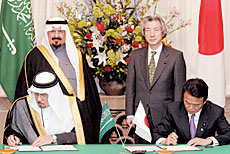TOKYO, 7 April 2006 — Saudi Arabia and Japan yesterday called for a Middle East free of nuclear weapons and wanted diplomacy to end the row over Iran’s nuclear program. Crown Prince Sultan and Prime Minister Junichiro Koizumi issued the joint call after official talks in Tokyo.
“Both sides stressed the importance of urging all the states in the Middle East to accede to the Non-Proliferation Treaty of nuclear weapons and making the Middle East region free from all weapons of mass destruction and their delivery means,” a joint statement said.
The crown prince and Koizumi “confirmed the importance of supporting the international diplomatic efforts that aim at non-proliferation of nuclear weapons as well as working for a diplomatic solution to the Iranian nuclear issue.”
The joint statement also called for finding a just and lasting solution to the Arab-Israeli conflict, adding that such a solution was essential to reinforce peace and stability in the Middle East. It also emphasized the need for accepting the results of Palestinian elections held in January 2006 as a step toward the formation of an independent Palestinian state.
Sultan and Koizumi also pledged to cooperate on Iraq, supporting its “stability and territorial integrity and promoting its national unity and equality among all groups of the Iraqi people.”
Sultan promised that the Kingdom would do what is needed to meet Japan’s energy requirements. Koizumi noted Saudi Arabia’s vital role in stabilizing the international oil market, being the world’s largest oil producer and exporter.
During his meeting with Koizumi, Prince Sultan expressed satisfaction over the progress in bilateral relations over the past years, wishing that the ties would grow stronger in coming years.
The crown prince and Koizumi later witnessed the signing of a memorandum of understanding for political consultation. State Minister for Foreign Affairs Nizar Madani and Japanese Foreign Minister Taro Aso signed the agreement.
Keiichi Konaga, chairman of the Saudi-Japanese Friendship Society on the Japanese side, briefed Koizumi on the society’s activities and its efforts in promoting Saudi-Japanese ties.
Konaga noted the initiative taken by Sultan to establish the organization in 1960 when he first visited Japan. Sultan gave $500,000 to the society as a donation from the Saudi government.
Sultan, who arrived here on Wednesday on a three-day visit, met separately with Emperor Akihito at the imperial palace. Crown Prince Naruhito was present at the palace to receive the Saudi crown prince and his delegation.
Talking to Prince Sultan, Akihito underscored the historic relations between the two countries. “Your royal highness’ present visit is an affirmation of our deep-rooted relations,” he said.
The emperor hoped that the royal visit would take Saudi-Japanese ties to new heights.
In his speech, Prince Sultan thanked the emperor for the warm reception accorded to him and his delegation.
“We in Saudi Arabia are proud of the friendly relations and cooperation with Japan,” the crown prince said.
He praised Japan’s important role in the region as well as in the world. “We wanted to expand our cooperation with Japan and work together to resolve Middle Eastern and international issues,” he added.
Akihito hosted a luncheon in honor of Prince Sultan, which was attended by top Saudi and Japanese officials including Saudi princes, Economy and Planning Minister Khaled Al-Gosaibi, Naruhito and Foreign Minister Aso.
The joint statement welcomed the decision to start free-trade negotiations between Japan and the Gulf Cooperation Council, which groups Saudi Arabia, Qatar, Bahrain, Oman, Kuwait and the United Arab Emirates.
Japan said yesterday it would launch free-trade talks with the GCC countries that provide three-quarters of its oil imports. According to a statement issued by the Trade Ministry in Tokyo, Japanese officials will meet their GCC counterparts in Riyadh next month to prepare for the negotiations.
“It is important to form and maintain friendly relations including economic ones with GCC states in terms of our country’s energy security and trade,” the ministry said in a statement.
Japan and GCC are expected to reach an FTA deal by 2008, according to business daily Nihon Keizai Shimbun. Japan hopes to use the talks to reduce the six states’ five-percent tariffs on most imports and to help Japanese companies export more automobiles and construction machinery, the daily said.
In their joint statement, Sultan and Koizumi expressed their satisfaction over growing joint investments. Japan also welcomed the opening of a Saudi commercial office in Tokyo.
The two sides agreed to intensify their talks on prospects of expanding joint investment. They will also continue their talks to reach an agreement for the protection and promotion of investment. Saudi Arabia supported Japan’s move to become a permanent member of the Security Council.
The Japanese side voiced its support for a recent statement made by Custodian of the Two Holy Mosques King Abdullah, rejecting the idea of clash of civilizations and calling for peaceful coexistence of civilizations. The Saudi delegation praised Tokyo’s role in promoting cultural dialogue and understanding.
The Saudi crown prince also met with Trade Minister Toshihiro Nikai later in the day. On Wednesday, Nikai met Saudi minister Al-Gosaibi. “During the meeting, Al-Gosaibi called on Japan to boost investment and provide support for personnel training in his country,” an official said.
Prince Sultan received the chairman and members of the Japanese Muslim Association here Wednesday. Omar Takashi, senior adviser to the organization, highlighted Saudi Arabia’s important role in the Islamic world and its efforts for the success of Islamic and Muslim causes.


